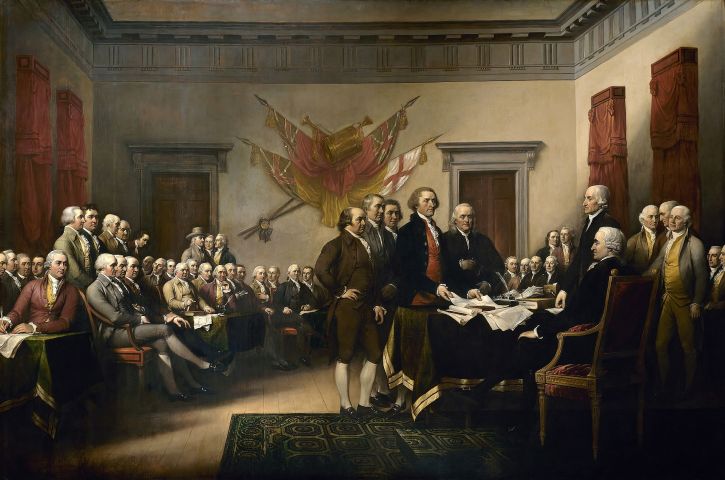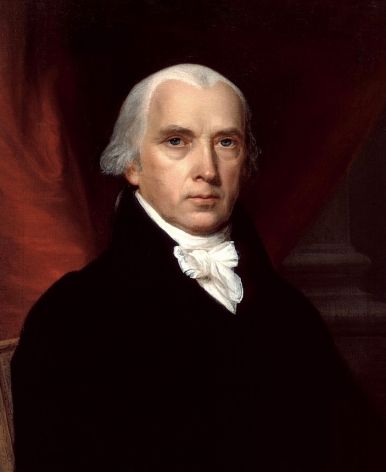.
July 4 Reflections What's Ahead for America?
 Photos.com
Photos.com
“We hold these truths to be self-evident, that all men are created equal, that they are endowed by their Creator with certain unalienable Rights, that among these are Life, Liberty and the pursuit of Happiness.”
These words, some of the most famous in the English language, are found in the Declaration of Independence of what would become the United States of America, adopted on July 4, 1776—a pivotal point in human history. As I write this on the evening of July 4, 2011, I can hear the thunder of fireworks exploding in the distance as Americans celebrate the nation’s 235th birthday.
Notice a truth that is self-evident in the words above: The men who wrote and signed this famous declaration believed that “all men are created” and that they have a Creator. The Declaration also refers to “Laws of Nature and of Nature’s God” and to “the Supreme Judge of the world.” Obviously God was very much in their thinking at that pivotal time.
What would the nation’s Founding Fathers think if they could see their nation today?
They would obviously be profoundly impressed at the material wealth and prosperity of the country. Our houses, highways, cities and communications would astound them. Our standing as the world’s lone superpower would amaze them. The sheer size of the country—“from sea to shining sea”—would astonish them.
But many other things would shock them, and clearly not in any positive way.
What would they think of the fact that we murder more than a million helpless, innocent, unborn children every year through abortion?
What would they think of the shocking plagues of immorality, adultery, sexually transmitted diseases, drug and alcohol abuse, divorce, sexual perversions, violence and crime that rot our nation?
What would they think of the staggering amount of debt run up by our governments—currently totaling more than half a million dollars per U.S. household—with no realistic way to pay it off?
Why is this nation, so strong for so long, now facing problems seemingly at every turn? Why does it seem that things have suddenly gone so wrong in so many ways all at once?
Thomas Jefferson, primary author of the Declaration of Independence and later the third President of the United States, wrote this warning: “Can the liberties of a nation be thought secure when we have removed their only firm basis, a conviction in the minds of the people that these liberties are the gift of God? That they are not to be violated but with His wrath? Indeed, I tremble for my country when I reflect that God is just; that His justice cannot sleep forever.”
Jefferson knew enough about history to know that a nation that forgets God will reap the consequences of rejecting our Creator—a lesson the United States is increasingly learning the hard way.
Another famous American President, Abraham Lincoln, said: “We have forgotten God . . . We have become . . . too proud to pray to the God that made us. It behooves us then, to humble ourselves before the offended Power, to confess our national sins, and to pray for clemency and forgiveness.”
What did these men know that we don’t? One thing they understood is the eternal truth of Proverbs 14:34: “Righteousness exalts a nation, but sin is a reproach to any people.”
They understood that ultimately a nation’s strength is only as strong as its faith in and obedience to its Creator. And they warned of exactly what we are seeing today. May we have the wisdom and heart to heed their warnings!: From: https://www.ucg.org/beyond-today/blogs/july-4-reflections-whats-ahead-for-america
________
July 4th - Independence Day and the Meaning of Liberty
“America’s Declaration of Independence continues to inspire hopes of liberty. What is the source of real freedom and liberty?
Transcript of YouTube: https://youtu.be/9fzxsTGrdyY
[Steve Myers] “It’s the 4th of July. What comes to your mind when you think of the 4th? Many things probably do - things like freedom, liberty, picnics…
[Darris McNeely] Absolutely, watermelon.
[Steve Myers] What about fireworks? All those things I think come to mind when you think of the 4th.
[Darris McNeely] Well, the July 4th holiday in the United States is a day that commemorates the signing of the Declaration of Independence. And it was not only a declaration of independence for the United States, but it really was the signing of a document that means - meant a great deal to the entire world. For a hundred years after the signing of the Declaration, more than 200 nations and peoples signed similar declarations declaring their independence from whatever form of tyranny and oppression that they were under. The document that Thomas Jefferson penned inspired a whole generation and continues to motivate us today. Probably the most quoted phrase is where it says, “We hold these truths to be self-evident, that all men are created equal, that they are endowed by their Creator with certain unalienable rights, but among these are life, liberty, and the pursuit of happiness.” Inspiring words really rooted and founded in Scripture.
[Steve Myers] It is found in Scripture. In fact, it’s not just an American condition. This is a human condition. It’s something that we as human beings, we all long for. And of course that was identified as an important part of God’s plan. God’s plan talks about liberty. 2 Corinthians 3:17 it says, “Now the Lord is the spirit and where the spirit of the Lord is, there is liberty.” And so God’s plan is wrapped around this concept of liberty and what it truly means to have spiritual liberty.
[Darris McNeely] And so, when we look at a document like this, when we observe a day like July 4th in the United States and other nations have their own periods and reflections on liberty as well. It is really from Scripture that we should gain our ultimate understanding of where freedom and liberty comes. But a document like this, signed by a group of people in July 1776, did begin something that continues to burn bright today. July 4, 1776 - a day that started a great movement and a great idea, the United States of America, freedom and liberty for all peoples, hopefully, and always in the Kingdom of God.” From: https://www.ucg.org/beyond-today/beyond-today-daily/july-4th-independence-day-and-the-meaning-of-liberty
________
The 4th of July and the Bible
“Though the Fourth of July is celebrated as America’s founding, our true heritage goes back further than 1776. Was America’s independence prophesied in the Bible?
 On July 4, the United States celebrates its 244th anniversary.
On July 4, the United States celebrates its 244th anniversary.
The Fourth of July holiday celebrates the signing of the Declaration of Independence, which declared the American colonists’ independence from Great Britain. Though this was when the founders declared their intention to break away from Great Britain, that independence wasn’t fully realized until after the bloody seven-year Revolutionary War.
On Sept. 3, 1783, the Treaty of Paris was signed, officially ending the American Revolution. In that treaty, Great Britain recognized the United States as a free, sovereign and independent nation. Historians continue to debate how a ragtag group of colonists with no national government could defeat a global empire and the world’s most powerful army. On paper, it was certainly a war Britain should have won, and there are many reasons the American victory over the British Army was miraculous.
Is there a reason to believe God’s providence was at work in history?
Victory did not settle America’s fate. The United States of America as we know it was not created spontaneously when Britain signed the Treaty of Paris or when the last British soldiers left New York in November 1783. The greatest challenge that faced the newly independent states was creating a functioning union that would bind the states into one nation.
The states’ becoming one unified nation was not at all a given early in its history. One of the greatest controversies after the Treaty of Paris was this issue: Would America become a collection of individual, sovereign states loosely tied together as a confederation, or would the individual states be unified as a nation—bound together by a powerful national government that would allow it to act as a single nation?
That issue took years to settle. If it were not for a series of miracles and compromises, the United States could have easily become a confederation of sovereign states (similar to today’s European Union)—or even fragmented into separate nations across the various regions of the American landmass. Imagine North America looking like Africa, Europe or South America—a continent containing several independent nation-states. That outcome could have happened.
From Articles to Constitution
The first attempt at a functioning union of the states was the Articles of Confederation. The United States operated under this document for eight years (1781-1789). It formed a very loose confederation between the states, led by a Continental Congress that had little power. Each individual state retained its own sovereignty and was not required to submit to the national government. Under the Articles of Confederation, there was no national executive office (president), no national currency (each state printed its own), and no national taxation. The national Congress had no power to govern commerce between the states or require the states to abide by treaties made with foreign governments. Throughout those eight years, the Articles of Confederation proved to be unworkable.
Failure at the Philadelphia convention could have resulted in a regional fracturing of America—preventing one union from coming into existence.
A growing number of American thinkers began to promote a different form of governance called federalism. This called for a stronger national government with an executive branch and a clearer delineation of powers between the states and national government. Those who supported this stronger union were called Federalists, and those who opposed it came to be known as Anti-Federalists. (History buffs can dive deeper into the arguments of both sides by reading the Federalist Papers and the Anti-Federalist Papers.)
It wasn’t until 1787 that the controversy began to be settled. Because of the inefficiencies of the Articles of Confederation (made obvious by the infamous Shays’ Rebellion), the states agreed to send delegates to Philadelphia to discuss making improvements to the Articles of Confederation.
Eventually, the delegates decided that the convention would become a constitutional convention, with the goal of designing an entirely new system of governance based on the principles of federalism. The challenge was whether or not the delegates could agree on a constitution that all states (large and small, north and south) would ratify. The stakes were high. Failure at the Philadelphia convention could have resulted in a regional fracturing of America—preventing one union from coming into existence.
Again, this outcome was not only possible, but was highly likely given the political atmosphere of early America.
A new Constitution
But, in about four months, the delegates were able to produce a new Constitution for the United States of America. It would bind the states into a strengthened union led by a national government with more powers. This was achieved through savvy politics, political compromise and intentionally not addressing one of the most divisive issues of the time—slavery.

James Madison was one of the principle authors of the Federalist Papers and U.S. Constitution.
After the Constitutional Convention finally had a finished document, the next order of business was convincing the individual states to ratify the proposed Constitution. The document itself stipulated that it needed to be ratified by at least nine states before it could go into effect. The challenge was getting large states like Virginia and New York to vote for ratification because, as large and powerful states, they had the most to lose in surrendering more authority to a national government. The Constitution could have theoretically been passed without all states ratifying it, but that would have ultimately left the land divided.
But all states eventually did ratify the Constitution. The whole process was completed (for the original 13 states) when Rhode Island finally ratified the new Constitution in 1790. With all 13 original states joining the union under the new Constitution, America was set on course to develop as one unified nation—eventually spanning from the Atlantic to the Pacific. But maintaining the union was not without its hardships—it took many more compromises and a bloody four-year Civil War to settle the issue of slavery once and for all.
The United States in prophecy
Okay, you may be asking, why is all this history important?
Did you realize that the United States’ breaking from Great Britain to become a nation was a fulfillment of a prophecy made over 3,600 years ago? As we explain in our article “How the Blessings of Abraham Came to the United States,” certain physical blessings were promised to Abraham. These blessings were passed down to his son Isaac, then to Isaac’s son Jacob and finally to Joseph’s two sons, Ephraim and Manasseh.
Jacob, in a very specific prophecy, declared that Ephraim would become a “multitude of nations” and Manasseh would become a single great nation (Genesis 48:19). Genesis 49:1 reveals that these promises were to be fulfilled in “the last days”—in other words, the modern era (from our historical viewpoint).
The promise of a “multitude of nations” was fulfilled by the British people—who became an empire and later a commonwealth of nations. Today Ephraim’s promises are primarily fulfilled in the nations of the United Kingdom, Canada, Australia, New Zealand and South Africa (as well as other smaller nations that are part of the Commonwealth).
Americans would do well to consider the life of their original founding father—the patriarch Abraham—and recall his life of faithful obedience to God.
Manasseh’s promise of being a single great nation was fulfilled in the United States of America.
As Americans celebrate the Fourth of July, they would do well to consider that the Declaration of Independence from Britain was necessary in order to fulfill the Genesis 48:19 promise. For the prophecy to be fulfilled, America had to be independent from Britain and had to unite into a unified single nation. The entire history of the development and ratification of the U.S. Constitution was essential for that prophecy to be fulfilled. This understanding helps us to see God’s providential hand in history (Isaiah 46:10).
This Fourth of July comes at a troubled time in this nation’s history. It comes as we are dealing with a persistent global pandemic and increased racial tensions and unrest. This nation seems to be increasingly more divided on a host of issues that many fear could tear it apart. Now is a time when America could greatly benefit from returning to its spiritual roots. Those roots go back much further than the days of Washington, Jefferson, Adams and Franklin.
Americans would do well to consider the life of their original founding father—the patriarch Abraham—and recall his life of faithful obedience to God, as described in chapters 12-25 of Genesis. In his life, we can find insight into our nation’s troubles today. He was a man who had his flaws and made mistakes, but grew from them and faithfully relied on God. You can learn more about him in our article “The Faith of Abraham.”
Originally posted on July 4, 2017; Updated on July 3, 2020.” From: https://lifehopeandtruth.com/prophecy/blog/the-fourth-of-july-in-prophecy/?
________
Update.
These posts about Independence Day are a history lesson for me. Being British, we didn’t learn as much about it as the American kids do.
With the new surge in Corona cases, we have ordered to wear masks most everywhere. This has some people wondering who can dictate to them and order them around. Me, not so… “Give to Caesar what is Caesar’s, and to God what is God’s.” Luke 20:25 and Mark 12:17. I assume that our TX governor has studied this, and knows what is best for us. Just like wearing our seat belts, it is to be safe, “Just in Case”. But they are stifling hot in this over 90° weather.
Finally, I was tired of my slow computer and ordered another desktop. It is a refurbished Dell High Performance Business one, with 16 GB Ram, and i7, so we will see how it does. It has a 60 day return, so that should give it a good try. I don’t know how I will get along with Windows 10 Pro, because I am used to Windows 7 and 8 Home!
Still no word as to when my cat can come home. Now that we have found out that he is a young cat, he might be better off if I let him be adopted to a permanent family. Then I could try to find and care for, an older, or special needs cat, an unwanted one, to give it a taste of a loving home.
My church neighbor and I had our Bible study on Thursday because I was making another trip to College Station on Friday to the HEB store for groceries that we can’t get here in this little Brookshire's in Navasota. But this time I rode with one of the other tenants here at the senior apartments, and he didn’t scare me driving that 75mph highway like some folks do.
But when I got home I found out that my AC wasn’t blowing cold! It is over 90° in the apartment. I reported it and here it is, a day later, and the 4th. of July, and still hot in here. Doesn’t the AC man realize when he got into the Heat and AC business, that it is like buying a milk cow… there are no days off. So I am still waiting to see if the AC man is coming here today.















No comments:
Post a Comment